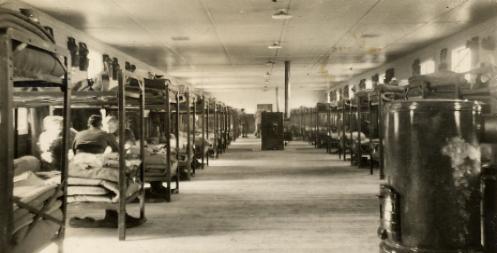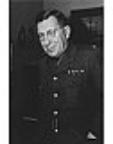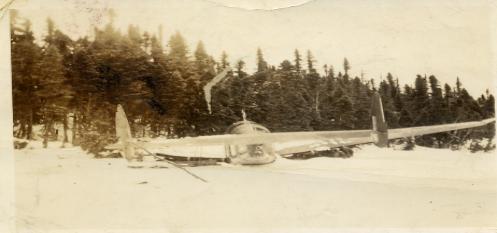Newfoundland, Winter of 1941
Early in January, 1941, the group of us there in Quebec City, were sent back to
the Regiment, which was then stationed in Botwood and Gander, Newfoundland. We
travelled by train to North Sidney, Nova Scotia, and from there to
Port-aux-Basques on the old ferry Caribou which ran a regular schedule between
the two points. The Caribou later became a casualty of the German U-Boat
activity in the Gulf of St. Lawrence, and her remains have lain on the bottom of
the Gulf, somewhere out there, all these many years.
joined my Company, "D" Company, in Botwood, glad to meet the friends I had made since joining the Army. Life in Botwood was rather quiet, since it was a small town with very little in the way of recreation, with the exception of ping-pong in the Salvation Army canteen. The guys used to amuse themselves by getting loaded on payday and busting up the Chinese restaurant in town.
One incident that took place while "D" Company was in Botwood involved a number of our lads. I'll not swear that it is true because I was not present at that particular time.
The Anglo-Newfoundland Development Company, a pulp and paper company owned a railroad, the A-N-D Railway, which ran from the mills in Grand Falls and Windsor to the port of Botwood, some twenty miles distant.
Occasionally we were permitted to hitch a ride to Grand Falls to spend the evening. The story goes that a couple of our stalwarts who's names shall, for the moment, remain hidden. It seems, as the story goes, that they poured enough "Screech" into the engineer and the fireman, that they were able to persuade them to let them take over the controls and drive the train back to Botwood.
One of them, who had been a railroader, undertook to drive while the other shovelled the coal, and between the two of them brought the train to Botwood in record time. I am open to verification, corrections, or even denials of this tale. At any rate if true, it's a good story, and the same if it is not.
 This picture was taken inside an H-Hut Barrack at Gander, Newfoundland, in the
winter of 1941. I believe that this side of the H-Hut shows the space occupied
by 17 Platoon in the foreground and 16 Platoon at the far end. What you see is
one wing of "D" Company hut. 18 Platoon and 18R Platoon occupied the other wing,
with the washrooms, laundry room, toilets, and drying room in between. This side
of "D" Company hut was situated about twenty feet from the main railway line.
This picture was taken inside an H-Hut Barrack at Gander, Newfoundland, in the
winter of 1941. I believe that this side of the H-Hut shows the space occupied
by 17 Platoon in the foreground and 16 Platoon at the far end. What you see is
one wing of "D" Company hut. 18 Platoon and 18R Platoon occupied the other wing,
with the washrooms, laundry room, toilets, and drying room in between. This side
of "D" Company hut was situated about twenty feet from the main railway line.
During the winter of 1941, "D" Company and "A" Company, which had shared duties in Botwood, exchanged places with "B" Company and "C" Company in Gander.
Life in Gander was dull with not much to do while off duty. I got a job answering the telephone in the control tower at the airport. That helped pass the time, and was rather interesting, because it was at that time that the Ferry Command was in full swing, with planes landing and taking-off for England at all hours of the night and day.
The job kept me off the bone chilling Guard Duty on the runways, a job which Lloyd Doull, then my Platoon Sergeant, still reminds me. While on duty at the control tower I witnessed the takeoff of the plane which bore Sir Frederick Banting, discoverer of insulin, to his death in the wilds of Newfoundland on February 27, 1941.

 Crash Site of Sir Frederick Banting's Last Flight
Crash Site of Sir Frederick Banting's Last Flight
Picture not to be copied without permission
In the spring of 1941, after spending the winter in Botwood and Gander, we were loaded onto the Newfie Bullet and moved to Lester's Field Barracks in St. John's. Quite a change, with the whole Regiment together again after being split up ever since leaving Sussex in November of 1940. The excitement of being in a big town after Botwood and then a few months at Gander Airport, was something we found no trouble taking advantage of, because there was no town at Gander, only the airport, the army barracks, the railroad, a few service personnel, and some RCAF people.
St. John's and Edgar
Many stories can be told of our stay in St. John's, so I'll begin with the one that occurred shortly after we arrived. This concerns a fabulous character by the name of Edgar. Edgar was from a tiny hamlet known then as little Montreal. What travelling he had done before joining the Army I do not know. He was a little older than most of us. He had the art of story telling and a sense of humour to set them off, sometimes crude, sometimes witty, but always attention-getting.
Edgar was in "B" Company. He was in Botwood just before we moved to the city. He showed up on Parade one day needing a haircut. Lieutenant Woodside* who was Orderly Officer that day, told him to make the necessary adjustments. Sure enough, Edgar went out on Parade the next day with a new haircut. Woodside bawled him out and told him to get a real haircut. The following day Edgar showed up with his scalp shaved clean.
In the prison camp,I shared a room with Edgar and some others for a while. He kept us amused with recitations of Drummond's poetry, and tales of his early days in Beau Glen. His humour and up-beat attitude during our days as POW's helped me to forget my miseries and to survive until 1945. Edgar also made it back home but he died many years ago.
We Move to St. John's
Soon after we arrived the good ladies of St. John's sought to welcome us by
inviting us to afternoon tea at the "Caribou Hut", the St. John's YMCA. Imagine
the scene. Dainty, sophisticated ladies, from the goodness of their hearts,
attempting to entertain us, serving tea and cakes to a group of soldiers who
were fresh from the boondocks, semi-literate, and certainly devoid of social
graces.
The tinkling of the piano rendering such classics as "In An English Country Garden", soon bored the audience, whose musical tastes favoured the songs of Hank Snow, and Wilf Carter. Someone shouted, "Labrecque! We Want Labreque!" Now Labreque was good, nay, he was expert at reciting the poems of Henry Drummond, "Leetle Bateese, The Stovepipe Hole, and especially, Jean-Batiste Trudeau, and had amused us on many an occasion.
After much catcalling and shouts of "C'mon, Edgar," he finally got up on the stage. He began by rubbing his cleanly-clipped head and apologizing for his lack of hair. Then he said, "I'm not in the mood to recite Jean-Batiste Trudeau today, but I'll tell you a story." What follows is the story he told ....
Edgar's Story of The Bicycle
Edgar began, "When I was young our family was very poor. I had always wanted a
bicycle but my father could never afford one for me. One morning he got up and
looked out the window. There, leaning against the house was a bicycle. My father
said, "Edgar, where did you get that bicycle?" I said, and these are Edgar's
words, "It's like this father. Last night as I was walking home, a girl came
along riding the bicycle. She said,'Hop on! We'll go for a ride.' So we rode for
awhile, then she steered us into the park. We sat down on the grass for awhile.
Then we lay down on the grass. Then, she took off her panties, and said, 'Edgar,
you can have anything you want.' The pants didn't fit, so I took the bike."
For a minute you could have heard a pin drop in that auditorium. Then the laughter started, and rolled until the rafters shook
Those poor ladies must have been scandalized. As far as I know, none of us even bothered to thank them for their kindness. We were probably preoccupied with plans to seduce their daughters at the first opportunity.
In St. John's there was an establishment that rented pedal bicycles. For a few dollars you could get a bike for a day, and another chap and I used to rent them to visit a couple of girls at Donovan's Siding, near Topsails. But this tale is about a Saturday just after payday when three of us, Crandal, Barney, and I decided to get some liquid refreshments, rent some bikes, and pedal out to Bowring Park.
We went to the liquor store on Water Street and bought some Sloe Gin, because in our unsophisticated taste for booze we thought it would work slowly, some Teacher's Highland Cream, because we thought is would be rich and creamy, and a bottle of the good stuff, Canadian Rye Whiskey. Then we set off for Bowring Park.
After a couple of snorts out of each of the bottles the inevitable happened. Soon we were riding up and down the walking paths, strictly against the rules, of course, bumping into each other, and enjoying ourselves immensely. We were soon ushered out of the park and we headed for home.
One of the bikes developed a faulty wheel, a condition that was not improved by getting a few kicks from an army boot. We returned the bikes to a very unhappy bicycle shop owner. I don't remember, but I hope we paid for the damages.
Crandall, mentioned in this tale, was killed in action.
I Become "D" Coy, Company Clerk
One day I was summoned to "D" Company's office and was offered the job of
Company Clerk. The clerk who preceded me was a pleasant chap, somewhat older
than the rest of us and probably because of the age difference did not
associate with us. He was also a drinker and I think that is why he was
replaced. We never saw him again.
Having a grade 10 education I was probably one of the better qualified academically to fill the vacancy. The job would be interesting, not too arduous and best of all would keep me off the parade square. Although I would still have to go to training exercises I was exempt from the daily grind of small arms training and other maneuvers. Of course I accepted.
As Company Clerk my job was to keep an account of the details of the happenings in the Company, such things as , "Sick Report", "Absentee Report" and a "Parade Report", "Detention Report", etc., and to turn in a daily report to Major Parker. It was not easy to juggle the figures and I was often tempted to cook the figures, a little, to make them jibe. But, I didn't though it was quite an accounting procedure for a 19-year old.
I loved the job. It gave me contact with the powers-that-be and a certain amount of prestige with the rest of the guys, and even some influence with other ranks higher than mine.
I had two runners under my control. Their function was to deliver messages and to keep "D" Company Headquarters informed of the goings-on in the rest of the Regiment. I remained on this job until we went into action, and even after I stayed as close as possible to Major Parker, acting mainly as a runner, because any attempts to maintain any sort of an office was a futile effort in the face of enemy action. But that story is yet to come.
Number One Water Street
Number 1 Water Street was one of those places which is found in every city, and let's not be coy about it, a place that is inevitably found by service men when far from home.
A group of the guys decided to visit the place one evening only to find that a bunch of English sailors off a ship that had recently docked in St. John's had taken over the amusement site. War was immediately declared and the battle started. It ended quickly enough, with the English sailors being dispersed, but not without a considerable amount of damage to their persons. The racket soon alerted the Royal Newfoundland Constabulary, and the chase began. It ended with three of the participants cooling off in police cells, and the rest of the gang making their escape back to Leste's Field.
It happened that the next day the Regiment was slated to move back to Canada. There were three of our boys still in custody and up for punishment before the Court. A Good Samaritan, who shall remain nameless, advanced the money needed to pay their fines, and they rejoined the Regiment in time to board the Lady Drake in St. John's harbour.
In early August, on the day following the events just described we packed up and left St. John's on the Lady Drake. She was one of the "Lady" line of cruise ships that had been pressed into service to transport military personnel, but only so recently that many of her regular staff were still on board in their regular capacities.
Graydon Heath and I shared a cabin on "A" Deck, luxurious accommodations for a couple of other rank's accustomed to sleeping on pailliasses in the bunkhouse. We were awakened each morning by the ship's bugler.
The food was excellent! The trip up the St. Lawrence was a great thrill for me, and I kept a sort of diary in the form of a letter which I sent to my Mother when we docked in Quebec City.
* Woodside, Arnold, Lt. kia.Dec. 19/41